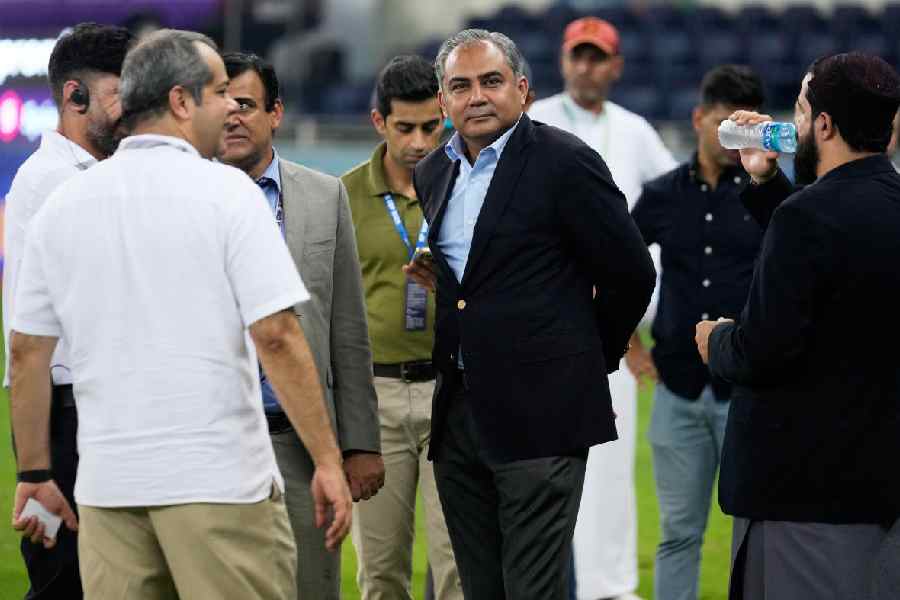
She’s lived with the film for the last six years. Manto — actor-filmmaker Nandita Das’s second film as director — is based on the life and work of controversial Indian-Pakistani playwright-author Saadat Hasan Manto and features Nawazuddin Siddiqui in the title role.
Feted at film festivals worldwide — Cannes to Rome to Toronto — Manto releases in India this Friday. Last Thursday, Nandita and Nawazuddin were in Calcutta to chat about their film and also hosted a special screening in the city. t2 caught up with the two at The Park for a chat on Manto and ‘Mantoyat’.

Nandita, you’ve lived with this film for a long time…
Nandita Das: For far too long! (Laughs) I know that going forward, whatever I do, this film will never leave me. It’s not just a film. The film is the means… the real end is my own helplessness and angst at what’s happening all around and my desire to respond to it.
What are the emotions like as we approach release day?
Nandita: I don’t know if there is one overriding emotion. I have realised that as you grow older, you tend to let go a lot. That’s especially true of Manto, which has been a spiritual journey for me. I want this film to reach as many people as possible and start a conversation. I’ve been with this film for so long that now when people talk to me about Manto and his work, I gauge what they must be like just based on the Manto work they like (smiles). For me, that is very fascinating.
Manto’s work touches upon topics like identities beyond religion and nationalism, freedom of expression, free-spiritedness as an idea, making him as relevant today as he was in the 1940s…
Nandita: Yes! Even more so now….
Nawazuddin Siddiqui walks in for the chat. Nandita complains about jet lag (she flew in the previous night from Toronto) and Nawaz laughs and tells t2, “Yeh Toronto se ghum ke aayi hain. Humein nahin leke gayi”.
Nandita: Achha, and who went to Rome for the screening? Aap hi toh gaye thhe!
Nawazuddin Siddiqui (to t2): She’s more popular abroad than we can ever hope to be! (Laughs)
Nandita: At least there they give importance to directors. Here, they only pay attention to stars! (Points to Nawaz and laughs)
We were talking about how relevant the film is today given the climate of clampdown on freedom of expression and divisive politics…
Nandita: I think we need to be reminded that there were people, even 70 years ago, who suffered a lot more than we are; we are self-censoring, we aren’t speaking the truth… and I think the film will be a great reminder of what we need to do. Like Manto, there were many other progressive writers who put their necks on the line because they believed in speaking the truth.

What made you cast Nawaz as Manto?
Nandita: Even though I had thought of him while writing it, we still did a casting of sorts just to get a feel of how he would look. I remember he wore a kurta-pyjama and he had a moustache. (Turns to Nawaz) Yaad hai? Hum Bombay ke chhoti chhoti galiyon mein gaye thhe… jo Manto ka Bombay tha? Once we went there, I just felt that Nawaz belonged to that space. I wanted somebody who could melt into the character without dominating the character. That’s because Manto was so layered and had so many contradictions. I wanted an actor who would make it so believable that they wouldn’t seem like contradictions, but just appear as different aspects of a character. I thought Nawaz was perfect for that.
Nawaz, was there a particular moment when you felt you had become Manto?
Nawaz: While making this film, my real and reel lives merged. Like Manto, I also believe in speaking the truth and during the time I was shooting this film, I found myself wanting to be honest to myself and to the world. Iss dauraan yeh sach bolne ka bhoot mujh par itna sawaar ho gaya ki maine ek book bhi nikaal daali (Nawaz’s biography called An Ordinary Life) which I had to withdraw eventually… maybe people couldn’t handle the truth (smiles and shakes his head).
Honestly, I didn’t know as much about Manto as Nandita does. But she created such an atmosphere on set that it became easy for me to slip into the character. Yeh jo Manto ka bebakpan tha woh mujh mein zyada pehle tha. After coming into this profession where you have to build a public image, I have lost quite a bit of the innocence I had. When I did Manto, it helped me go back to the person I once was. Even after I finished shooting the film, I called up Nandita and told her, ‘Please kuch karo taaki yeh dafaa ho jaaye meri zindagi se!’
Nandita: He was like, ‘What have you done? I am not being able to come out of being Manto!’
Nawaz: So much so that I didn’t feel like doing any other film after Manto, and this feeling stayed with me for quite sometime. He had the courage to tell the truth. Some of us also do, but zamaana aisa hain ki bol nahin paate.
Nandita: Like Manto says in the film, ‘Agar aap mere afsaano ko bardaasth nahin kar sakte hain, iska matlab hain ki zamaana hi nakaabile bardaasth hai’.
Nandita, your script was very detailed, but how much did Nawaz bring to Manto?
Nandita: Oh, a lot! I may have had the research and the vision, but a character is built by the combination of a director and an actor. My job was to give him that mahaul, but finally he had to bring his truth and talent to it.
Did he surprise you in some scenes?
Nandita: That was the fun part. Sometimes, there would be something in his eyes that perhaps even he didn’t know. I must have watched the film a million times, but every time I see some scenes in the edit, I react to them like I am seeing them for the first time. That’s the magic of the actor called Nawaz.
There’s a scene in a hotel in Lahore between him and Tahir (Raj Bhasin, who plays Shyam) and Manto asks Shyam, ‘Mera Bombay kaisa hai?’
I get goosebumps every time I watch that scene. Both Nawaz and I agreed that the power of every scene would come from the truth of the moment and that it would never be emotionally manipulative.
What was the challenge of making a film on a real person?
Nandita: The challenge was huge. Manto died at 42. There was so little material about him. In the beginning, I felt frustrated because there is not a single video of the man… we don’t know what his voice was like; later, that actually became a sort of freedom because both Nawaz and I could interpret Manto in our own way. Humne woh Manto banaya jo humko relatable lagaa, of course keeping it as authentic to the material we had on him.
In the film, some of Manto’s short stories are woven into the narrative. Was that tricky?
Nandita: That is something I wanted to do right from the beginning. I knew I could never tell the story of Manto without giving the viewer a glimpse into the writings of the man. In his work, the lines between fact and fiction are blurred, and I wanted to keep that seamlessness in the film.
Will someone who hasn’t read Manto feel alienated when they watch the film?
Nandita: Not at all. In fact the film is more for people who don’t know anything about Manto. There are some who have half-baked knowledge about Manto and this film will be an eye-opener. Some know Manto’s works very well and even for them, I have tried to put in some precious nuggets. I have shown the film to some people who are Manto authorities, and they have loved it (smiles).
What do you think is Manto’s enduring legacy and will the film help discover the ‘Mantoyat’ in people?
Nandita: Yes, that’s the purpose of our film. Everyone has Mantoyat — the desire to speak the truth — in them. That fearless, free-spirited side of us… we are all uncomfortable because we are not what we want to be. Manto pushes you to be who you are. You see him struggle, but you want to be like him. That’s his legacy.
Nawaz, have you been able to keep the Mantoyat alive in you even now?
Nawaz: Nahin! (Laughs)
Nandita: That’s very honest… and very Manto!
Nawaz: I have the guilt and the discomfort that I can’t be like him. The youth will definitely connect with the film because young people are idealistic. It’s only when you grow older that disillusionment sets in.
Nandita, Nawaz gives us a couple of films a year, but will we have to wait 10 years for your next film?
Nandita: (Laughs) No, no much sooner. In fact, Nawaz and I are planning to do something.
Nawaz: Nikal padenge camera leke aur dekhenge what we can make. Manto has made us fearless, at least (smiles).










